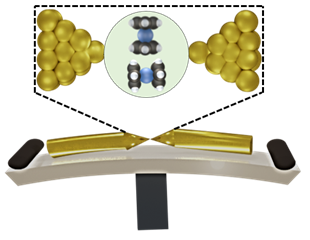Kolkata: In a groundbreaking development, scientists at the S. N. Bose National Centre for Basic Sciences have created a unique transistor controlled by mechanical forces using single molecules. This innovative approach could lead to significant advancements in quantum information processing, ultra-compact electronics, and sensing applications.

A Novel Approach: Mechanically Controllable Break Junction (MCBJ)
Traditionally, transistors are controlled by electrical signals, but this new transistor leverages mechanical forces. The researchers used a technique called Mechanically Controllable Break Junction (MCBJ), where a piezoelectric stack is employed to precisely break a metal wire at the sub-nanometer scale, creating a gap suitable for a single molecule, such as ferrocene. Ferrocene is a molecule consisting of an iron atom sandwiched between two cyclopentadienyl (Cp) rings. The scientists found that by manipulating the molecule mechanically, they could alter its electrical properties, demonstrating the feasibility of mechanical gating to control electron transport at the molecular level.Influence of Molecular Orientation on Performance
Dr. Atindra Nath Pal and Biswajit Pabi, along with their research team, discovered that the orientation of ferrocene molecules between silver electrodes plays a crucial role in the transistor's performance. Depending on how the molecule is oriented, the transistor can either increase or decrease electrical conductivity through the junction, highlighting the importance of molecular geometry in designing future transistors.






















